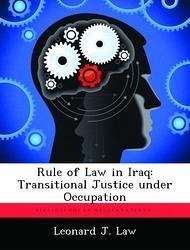In 2003, the United States led a Coalition force into Iraq to depose Saddam Hussein 's repressive Ba 19ath Party regime. Under the provisions of the Hague Regulation of 1907, the Coalition became an occupying power with all of the attendant rights and responsibilities. To administer Iraq during the occupation, the United States and its allies established the Coalition Provisional Authority. The Coalition 's responsibilities included establishing the rule of law to replace Saddam Hussein 's rule by decree. The key elements of establishing the rule of law were helping Iraq to reestablish its judicial system and deal with its past. Following the war, Iraq 's justice system was a complete shambles. The courts were looted and vandalized and the legal codes were corrupted by decades of Saddam Hussein 's decrees. Thousands of former regime officials were subject to criminal charges for participating in the Ba 19ath Party 's brutal acts. To deal with the complex issues involved in restoring the rule of law, the Coalition Provisional Authority and the Iraqi Governing Council looked to concepts of transitional justice developed during the last part of the twentieth century. This monograph compares the Coalition Provisional Authority 's application of transitional justice mechanisms to international experts 19 recommendations. The majority of current thought on transitional justice derives from transitions in former Communist regimes of Eastern Europe, and South Africa after apartheid. As a study of justice under occupation, the paper focuses on transitional mechanisms appropriate to an occupying power. Military planners need guidelines and effective analysis to plan for restoring rule of law in occupations and peace operations. The Coalition Provisional Authority 's errors are significant. The administrative justice process of de-Ba 19athification disenfranchised tens of thousands of Iraqis, leading to widespread unemployment and contributing to armed insurgency. The Coaliti
Hinweis: Dieser Artikel kann nur an eine deutsche Lieferadresse ausgeliefert werden.
Hinweis: Dieser Artikel kann nur an eine deutsche Lieferadresse ausgeliefert werden.








